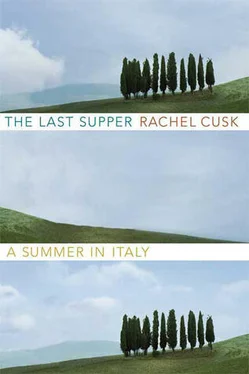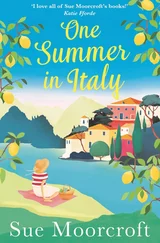It is the World Cup quarterfinal. Italy are playing. This event courses through the geology of old Rome as evening falls, like a wave breaking into a cove and rushing through its fissures and crevices, briefly filling its twisted, ancient gulleys of rock. The cafés put out their television sets. People form deltas on the pavements at the mouths of crowded bars. The cars backed up in the narrow streets blare their horns, streamers hanging from their windows. In the Piazza Navona boys are detonating canisters of colored smoke. They skirmish on their Vespas, naked to the waist, brandishing flags whose flowing drapery and long poles impart the final classicism to their painterly forms, so that they look like figures in a battle scene, forever skirmishing in the blue fog of war. The Pantheon and the Colosseum and the Palatine Hill are not insensible to this modern kind of frenzy, for they give it form. They are refreshed by it, as the rock is refreshed by the wave. Nevertheless, the city retains a core of obliviousness. There are still people wandering around with suitcases, people staring into shopwindows, people consulting maps in the last light. There is a woman lying in a doorway, unconscious, covered in mud. There are waiters standing on the thresholds of empty restaurants. There are tourist families sitting at brightly lit tables, a little awkward-looking, as though they are surprised and slightly disappointed to find themselves unaltered, sitting around a table exactly as they do at home. The hot, motionless, indigo-colored evening passes into an annihilated blackness, like something burning out. Now and again the din of rockets and car horns and klaxons is suddenly ignited all across the city. Italy have scored another goal.
We stay out late, until the game has finished and the crowds dispersed and the cars and Vespas are blazing like comets up and down the Via Nazionale proclaiming victory, shrieking past in a shower of horns and lights. On the bus the other passengers seem mysterious, inscrutable, distinguished: when they speak, their Italian is so formal and correct that it is difficult to understand. Their faces are ancient and aristocratic. Though the night is hot they are attired with lavish sobriety, like royalty. Their eyes seem to be looking at great distances within themselves. These are Romans: they are quite different from the other Italians we have observed. They have a certain proud Travertine stillness about them, a monumental quality. They seem quintessentially European; they are a kind of race. “Rome is inhabited by know-nothings who do not want to be disturbed,” Federico Fellini once remarked. “The Roman is like a grotesque, overgrown child who has the satisfaction of being continually spanked by the Pope.” And indeed, not so long ago Rome’s infamy had something of the quality of metaphor. Endowed and tainted to the core, it seemed to express an ultimate cynicism that could outpace any human attempt at nobility. It was the capital city of corruption and pollution and hypocrisy, of unbecoming gropings on public transport. But now even the mano morta is no more: apparently the Roman male keeps his hands to himself. An Italian told us that the phenomenon ceased a few years ago. She could give no reason why: it just stopped. It was, perhaps, the Italian capacity for evolution that caused this unfashionable trait to be so abruptly discarded. In this city, where time does not pass so much as refine itself, analyze itself, questions of being and behavior may become entirely psychical. It would be possible, I think, to have no conscience at all, if you walked past the Colosseum and the Forum each day. It would be in the psyche, the root, that actions were decided.
The bus passes the Palazzo Barberini and emerges into the broad, flat distances of the Via XX Settembre. In the charred darkness the lit-up buildings look like monsters, or ghosts. We are staying a little way out of the center, in a small hotel that is reached through its own garden, where birds dart from the hedges and the other guests sit here and there in the shade, their eyes closed and their hands folded in their laps, as though the birds and the green garden and the city beyond it are things they are dreaming. Our room is at the top, in the eaves. The ancient lift rises slowly through the center of the stairwell, so that people walking up and down can be seen through its glass panels. On the way down the children generally take the stairs, running round and round us in our glass capsule, laughing and waving at us through the banisters. This activity never fails to amuse them. It strikes me that they find in it a reversal of the usual order of things, for though we all take the same course, in general it is we who are free and they enclosed in the mystery of our plans. Their excitement is tinged with anxiety: what would happen if the lift got stuck, and they could see us but not reach us? At home they are not conscious of such fears, but here, in a foreign city in a foreign land, in a labyrinth of separation whose twists and turns did not end at Newhaven but rather began there, so that the original separation could never be found in all the relinquished affection that has followed it — here their bond to us is strong, with not an inch of slack. Later, back in England, they speak constantly of Italy, even when the months away have been matched fivefold by those since our return. They say that Italy is where they would most like to live in the whole world. They say that as soon as they are grown up, they are going back to the valley and the castello , forever. They will buy a farm, or perhaps the house itself. When they speak like this they remind me of the characters in Italo Svevo’s A Life , of the hero Alfonso, whose experience of love and belonging could not be disentangled from his mother and the valley where he grew up. For the children, the sensory experience of Italy was fused with uninterrupted proximity to their parents, and so they wish to return there, even though in their fantasy they are now the adults and we are absent. Yet I recall the pain they felt at the time, of having left their friends and home behind, the pain of knowledge: this, it appears, was entirely distinct from their love of the place in which they now found themselves. Back in England, the memory of Italy does not cause them pain. They feel a longing that is more fundamental, that is the preference of their souls. They have been formed, not bereaved, that much is clear.
In the morning we walk, skulking on the fringes of the tourist crowds. The city is hot, packed, turbid, with a faintly volcanic scent of rocks and dust. The barging traffic releases its fumes, shimmering and nacreous, into the hazy sky. We wander in the dry gardens of the Villa Borghese, along the fine dirt paths. We visit the Trevi Fountain, hidden in its network of narrow alleyways like an idea flowering secretly in the dank network of the brain. Its white, fanciful extravagance has been found out, like the sick rose in Blake’s poem. It is crawling with people, whose clothes and bags and camera equipment look malevolent, arachnoid, against the foaming white. We visit the Roman Forum, the great decaying cavity splayed out, dissected-looking, under the sun. People clamber in the rubble with their cameras: some of them move in big, indifferent groups behind their guides, and some are in couples, quietly conferring, a faintly strained air about them, as though the whole civilized enterprise of their union is under threat from the shock of the unruly past; as though it is the future that has decayed and vanished and abandoned them here, in the ravaged Forum in their Gucci sunglasses and expensive shoes.
We climb up the Palatine Hill and then emerge out into a deserted backstreet. It is silent here, blank: now and again a person comes out as we came out, unexpectedly, as though falling from a dream. They pass us, looking around in bewilderment, and disappear. After a while we walk on, through one empty street and then another. We come out on the Capitoline Hill and enter the Palazzo Nuovo of the Capitoline Museum. There are few people inside, though the world’s richest collection of Roman art and relics is here. It is cool and quiet, eternal. Outside there is a feeling of eternity too, except that it is an eternity of repetition, of the same moment being lived over and over again, day after day, as people see the landmarks of Rome for the first time; always new people doing exactly the same thing, just as the water that runs ceaselessly over a rock in a riverbed is always new. But inside the museum it is as deep and still as a lake. We sit motionless in the window seats of the sculpture rooms on the first floor. We stare at Aphrodite and Venus and Eros, at Homer and Hercules, and they return our stares. They are so white and hard and perfect, so aloof. Their forms are so familiar that they seem like fellow creatures, yet we belong to the perishable race that runs in its endlessly renewing moment over the riverbed. The children are exhausted and dumb. Today they cannot accept the discipline of art. Their skin is brown and they wear patterned cotton scarves tied around their hair. Their feet in their sandals are dusty. We show them the sculpture of the little girl with the dove; we show them the Spinario , the boy pulling a thorn from his foot. These frozen images glimmer in the underwater light of the museum. It makes no difference that they are images of children: today they emanate only perfection and death.
Читать дальше












